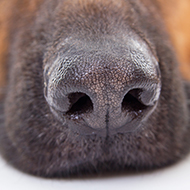
Dogs to be used to prevent virus spread in public spaces.
A veterinary clinic in Germany has successfully trained detection dogs to detect COVID-19 in human saliva samples with 94 per cent accuracy.
A three-year-old Belgian shepherd named Filou and a one-year-old Cocker spaniel named Joe Cocker, are two of the dogs being trained at Hanover’s University of Veterinary Medicine.
They are conditioned to scent out the 'corona odour' that emanates from the cells of people infected with the virus.
Head of the veterinary clinic Holger Volk said: “We did a study where we had dogs sniffing samples from COVID-positive patients and we can say that they have a 94 per cent probability in our study ... that they can sniff them out.”
“So dogs can really sniff out people with infections and without infections, as well as asymptomatic and symptomatic COVID patients.”
Stephan Weil – the Prime Minister of the state of Lower Saxony, where Hanover is located – expressed his support for the study, calling for 'feasibility tests' at selected events before the dogs could be put to work in everyday life.
Across the world sniffer dogs are being used to detect COVID-19 in public spaces. Dubai airport, Finland’s Helsinki-Vantaa airport and Chile’s Santiago international airport are using COVID-19 detection dogs, and sniffer dogs were also used to check fans at a recent Miami Heat basketball game in Florida.



 RCVS Knowledge has called on vet practices to audit their post-operative neutering outcomes.
RCVS Knowledge has called on vet practices to audit their post-operative neutering outcomes.